#but the core message
Text
Hello, Stranger. By Will Buckingham. Granta; 336 pages; £16.99
The Power of Strangers. By Joe Keohane. Random House; 352 pages; $28. Viking; £16.99
Fractured. By Jon Yates. Harper North; 348 pages; $28.99 and £20
ATTITUDES TO STRANGERS tend to follow a familiar pattern. Children are taught never to speak to unknown grown-ups, especially those regarded by their parents as untrustworthy. The onset of adolescence and young adulthood brings a bursting desire to interact with all sorts of people, particularly the kind who might not elicit family approval. Whether the resulting encounters are sexual or social, they confer a thrilling frisson of escape.
Social circles generally narrow again as people find life-partners, form households and produce offspring of their own. Time becomes scarce; new friendships are often based on sharing the burden of child care. Some people never recover the youthful zest for unforeseen liaisons. Professional duties swell even as parental ones diminish, and the inclination sags. In old age, even if curiosity and charisma remain undimmed, frailty makes new serendipitous connections harder to establish.
But that is not the whole story. In mid-life and beyond people can still experience the joy of a random meeting, however short, which somehow touches a nerve. That might involve nothing more than a smile, or a chance remark that hits an emotional spot; or it might be an unexpectedly deep conversation on a plane or train, a surge of mutual understanding that is life-affirming even if the interlocutor is never seen again. This aspect of the promise and peril of strangers has enticed storytellers—from the rapture of “Brief Encounter” and “Before Sunrise” to the ruin of “Strangers on a Train”. The knowledge that the exchange will be a one-off can permit a delicious, uninhibited frankness.
In the age of covid-19 and Zoom, the chronological pattern has been warped. Instead of their hazy possibilities and risks, strangers have assumed an all-too-literal role as a looming source of infection. During lockdowns they are officially to be avoided. Yet youngsters still long, dangerously, for the ecstasy of communion, not just with edgy individuals but anonymous crowds. People of all ages have come to miss the human stimulation of busy high streets or trains, or the comforting sense of fellowship in a cinema or theatre audience.
So this is an apt moment for three books about meeting strangers. Will Buckingham has written a moving memoir of finding solace, after the death of his life-partner, in travelling and talking in lands such as Myanmar that are culturally distant from his native England. Joe Keohane, an American journalist, argues that communicating empathetically with strangers is vital and potentially life-changing. Jon Yates, who runs a youth charity based in London, frets that deep fissures in Western societies are making it impossible for people to reach, even casually, between classes, religions, ethnicities and generations.
All three authors make sweeping generalisations about the evolution of human society, from hunter-gatherers to the age of Homer and beyond. But they are more interesting when they reflect, using personal experience or scientific research, on how people live and communicate now. In different ways, they all make two separate but related points. First, interacting meaningfully with a new person can bring huge rewards—but it is a skill that must be cultivated and can easily be lost. Second, the self-segregation of modern Western societies means that, for many people, conversing with some fellow citizens seems pointless, undesirable or outlandish. The second problem exacerbates the first: if you consider others beyond the pale, why make the effort to get to know them?
. . .
Mr Buckingham focuses on the pleasures and pitfalls of encounters in remote places where the stakes are lower because the acquaintanceships are bound to be temporary—in a holiday flat-share in Helsinki or while travelling through the Balkans. But, like the other two, he notes that wariness of unfamiliar people is neither new nor insuperable.
Faces look ugly when you’re alone
Mr Keohane and Mr Yates offer tips on befriending strangers. . . Mr Yates discusses the case for a kind of national social service that would encourage youngsters to mix with other groups and generations. Both have homely micro-solutions that readers can apply in daily relations—assume the best of others, remember that most have stories they are longing to tell, react philosophically when a friendly approach is rebuffed.
A telling point that none of the books captures is a paradoxical one: some of the most sophisticated forms of interaction between strangers occur in societies that are chronically divided. Think, for example, of rural Northern Ireland, or of parts of the former Ottoman Empire, such as Lebanon, where residents have lived in separate communal silos. In ways impenetrable to outsiders, the denizens of such places develop perfect antennae for the affiliation of a stranger and adjust their remarks accordingly. The ensuing exchanges occur within well-understood parameters—including a sense that social categories are resilient and pleasantries will not change them. But tact allows people from antagonistic camps to have amicable encounters and transactions.
All three authors are inclined to overstate the ability of brief interactions to stave off conflict. Yet at least this much is true: a capacity to engage with new people in civilised, humane and meaningful ways is a necessary condition for social peace, even if it is not a sufficient one. That points up a half-hidden cost of covid-19. Children educated on screen; teenagers bouncing off the walls; adults working at home; lonely pensioners: more or less everyone’s social skills have been atrophying, with consequences not only for individuals but, perhaps, for the fabric of society.
As lockdowns lift, people are now stumbling back into a world of accidental collisions, some eagerly, some queasily, most with an odd sensation of novelty after a year of hibernation. The lesson of these books is that the easing of restrictions is not just a coveted opportunity to reconnect with those you love and resemble. It also restores a freedom, long taken for granted even if little used, to come to know the profoundly different. ■
#there are definitely things in this article I don't fully agree with#but the core message#be civil when you're in public around strangers#is something I can agree with
43 notes
·
View notes
Text
MEDUSA WASN’T A MONSTER BECAUSE SHE HAD SNAKES FOR HAIR BUT BECAUSE SHE HURT PEOPLE WHO DIDN’T DESERVE IT LET’S FUCKING GOOOOOOOO
#not everyone who looks like a hero is a hero and not everyone who looks like a monster is a monster!!!!!#they’re not just sticking to the core theme of the books; they’re ENHANCING the message!!!#percy jackson and the olympians#pjo#percy jackson disney+#disney percy jackson#disney pjo#rick riordan#medusa#percy jackson#percy jackon and the olympians
8K notes
·
View notes
Text
The Barbie movie really said. Yes you will grow up and childhood wonder will vanish. Yes you will grow up and learn to hate yourself, your body, your awkwardness. Yes you will grow up and lose your confidence and certainty and sense of purpose. Yes you will grow up and the world will seem a bleaker, lonelier place every day, and society will seem bleaker and lonelier every day, and you won’t understand what went wrong in the span of just a few years, what took you from a happy and secure young girl to a sad, uncertain, scared grown woman.
And yet. You will learn to find beauty again. You will find joy in not having a purpose, in building a purpose for yourself. You will find beauty in connection, with the people and the world around you. You will learn to love signs of ageing as proof of a life well lived, of experience and happiness. You will take that little girl by the hand and tell her “I know, this isn’t what you thought it would be, but it’s real. Let me show you how beautiful it can be.”
#idk I’m just really really emotional about this movie#it hit me in my core#like I loved the political critique obviously but#the message about growing up and losing your sense of identity and purpose just resonated with me#I’ve been crying about this since I saw the movie lmao#and I haven’t really seen a lot of commentary on this theme#barbie#barbie movie
16K notes
·
View notes
Text
Shoutout to the radish guy in Spirited Away for deciding to go all the way up to the top floor just to make sure Chihiro was safe when presumably he had other shit to do and could just have easily decided this little girl's safety was Not His Problem.
7K notes
·
View notes
Text
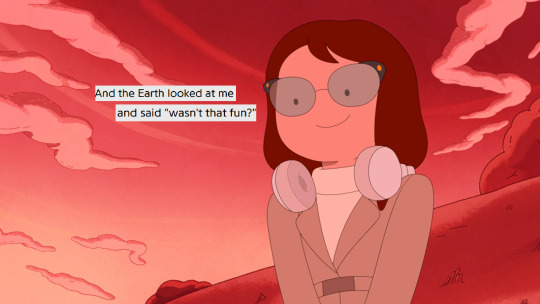


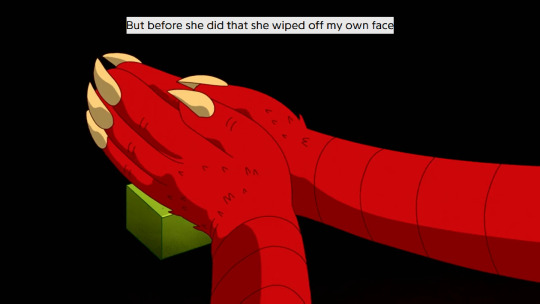
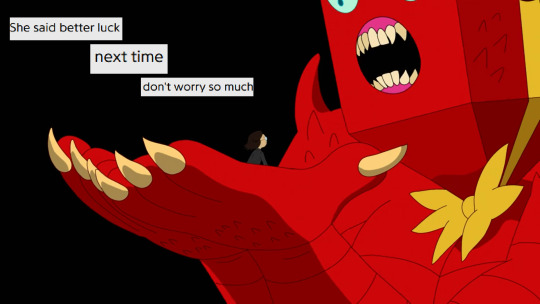
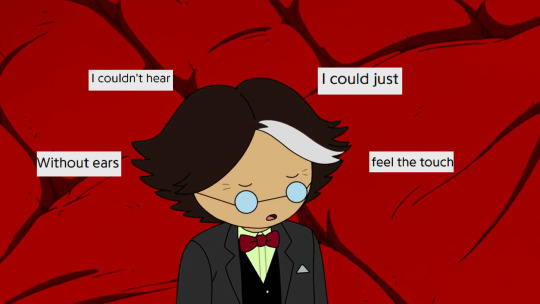
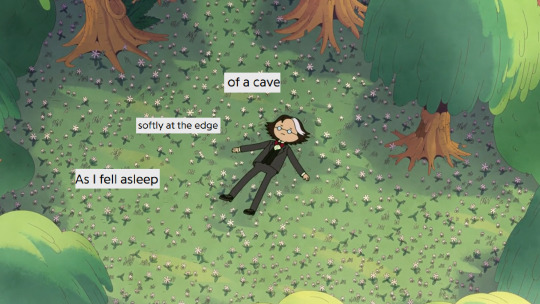
oh, i should have gone deeper, but i'm not so brave
when i was done dying - dan deacon // fionna and cake - "cheers"
#web weaving#adventure time#fionna and cake#fionna and cake spoilers#simon petrikov#betty grof#petrigrof#this is what the golbetty scene reminded me of hehe#wwiwdd is a very fi and cake song anyway. like the series overall#i very much enjoyed the show and i like that the ending was open ended#even if a bit unsatisfactory thats reflective of life! the day after the end etc yk#we keep on living even after a supposed ending to the story and i like that message being at the shows core
5K notes
·
View notes
Text


Japan and France are joining Germany, Italy, Britain, USA, Canada, Australia, Finland, the Netherlands, and Switzerland in pulling funding from UNRWA.
#messages from mars#palestine#core countries will do what they do best! enable and commit terror on the rest of the world
1K notes
·
View notes
Text
WAIT I WANNA BRING UP ANOTHER THING ABOUT HOW BULLYING IS ADDRESSED IN NERDY PRUDES MUST DIE. one thing I really liked about how Max is shown as a bully is his talk with Pete at the Pasqualli's parking lot. When Pete tries to stand up to Max, Max pushes him down and emphasizes that Pete isn't a loser because of his own qualities - rather, Pete is a loser because Max simply said so.
Of course we can attribute this to Max's god complex but I think that this point in particular is less than often really brought up in teen-centered media featuring bullying: that bullying exists not because of nerdy behavior or whatever the fuck, but because bullies will it into being. And to have a BULLY of all people say that out loud - to have the main villain point out the root of their behavior without showing any kind of shame whatsoever - showcases just how much of a menace Max is.
#like max is really fuckin self aware throughout the show#he knows he's the biggest prick alive and he revels in his jackassery#to the point of pointing out the core problem of bullying itself: people are bullied because people are bullies. simple as that#like its a good message to hammer down in the bullying problem of the show while also showing how far gone Max is with his delusion of power#so um yea#oki at this point it's kinda obvious that my favorite character in the show is max jagerman like writing wise#dude's portrayed as an irredeemable literal monster and the show doesnt shy away from the fact that the dude isnt getting any redemption arc#and yet there are nuances to him being overzealous with his power both in life and in the afterlife#SO YEA STARKID DID A GREAT JOB IN WRITING MAX LIKE DAMN#starkid#nerdy prudes must die#npmd#npmd spoilers
1K notes
·
View notes
Text
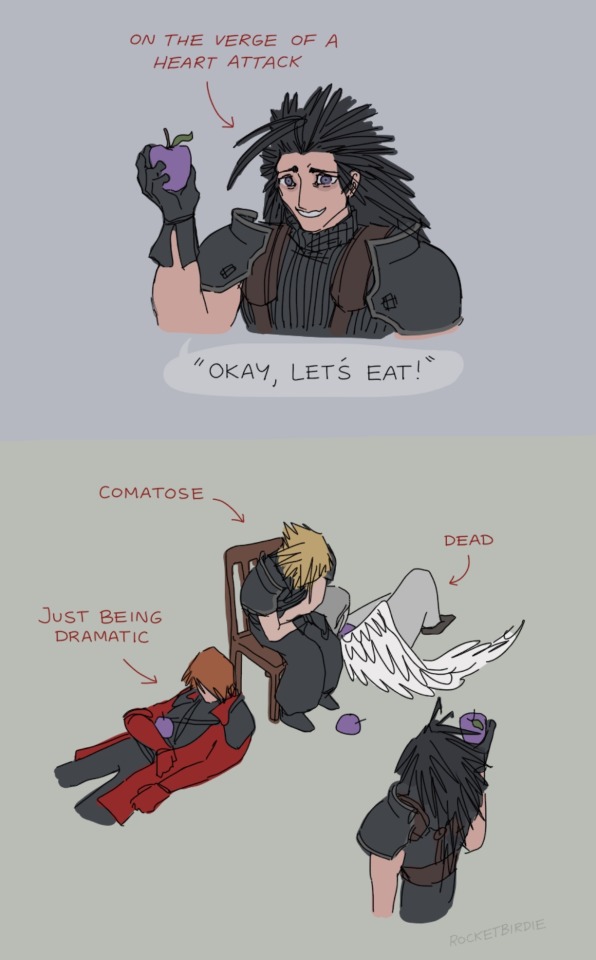
deranged picnic
#obsessed with how this game manages to maintain a consistent utterly unhinged vibe for its entire runtime.#this scene is immediately followed by him receiving a letter from his girlfriend saying she's breaking up with him.#he gets the letter from an eldritch abomination in the form of his mentor's face on the body of dead dog as it turns into magic dust.#also his gf broke up with him because he wasn't returning any of her messages while he was being tortured in a dungeon for four years.#which is actually how he finds out it's been four years. he's been under the impression that it's been like. 2 weeks lol#the guy on the left is perfectly alive and monologuing the whole time.#and he happens to be the same guy that made clones of himself and went on a crusade to eat chunks of the protagonist's hair.#sighh..... crisis core my beloved........#(derogatory)#my art <3#ffvii#crisis core#oh god i forgot his scar. nobody look. don't look. you don't see shit.
792 notes
·
View notes
Text

draw a bunch of my friends' 621 today.
they are all so cute ... little beans ....
#sorry im not normal about 621 i love them all#armored core#armored core 6#c4 621#albi’s art#i feel like mr worldwide doing this cuz i were writing thank u messages in 3 languages#(jp kr and eng)
381 notes
·
View notes
Text









#Emote#emoticons#emote#emoji#emoticon#emoji pixel#y2k#old web#y2kcore#2000s core#webcore#00s#gif#pixel#pixel gif#moodboard#2000s#web#pixels#message#icon#icons#ico
507 notes
·
View notes
Text







DAVID TENNANT as THE META-CRISIS TENTH DOCTOR
Happy 15th anniversary, Journey's End! (5th of July 2008)
#dwedit#dwgif#rtdedit#doctor who#dw#tenth doctor#tentoo#metacrisis doctor#dailydwgifs#scifigifs#malecharacters#userstream#chewieblog#tvandfilm#usertom#usernani#userdiana#he's my baby you wouldn't get it.....#do u understand. the entire core message of the show: humanity is special and the ordinary is extraordinary#all tied up in one ending#that humanity is so special that if the doctor could be one of us he would?#god.#thank you forever rtd <3
936 notes
·
View notes
Text
sorry imagining 621 recording pater's impression of rusty and showing it to him and rusty being kinda defensive like "i don't sound like that".
96 notes
·
View notes
Text
Hi since it's aro-spec week I'd like to just highlight one of my absolute favorite things about httyd, from the viewpoint of an aromantic:
The importance it puts on platonic relationships.
The whole franchise is of course, centered around Hiccup and Toothless' bond. They're friendship is from the beginning built on unconditional trust. They care for each other so much. They are best friends, hey mean everything to each other and have a bond nothing else (even romantic relationships) could ever rival.
(I could say so much more about them honestly but it's all probably been said before by someone better at articulating their thoughts so whatever)
Another aspect I love is while there are romantic relationships and plots, they're not shoved in the audience's faces. Other than certain episodes dedicated to Hiccstrid's development, it's mostly just, there. Neither the story nor the characters' lives revolve around it and it's honestly a bit refreshing.
Hiccup and Astrid very clearly value they're friendship. In the episode they got together, what Hiccup said to her very clearly implied how important to him she is, and he'd be fine even if they weren't romantic partners, as long as they can still be with each other.
And that's so special to me.
Like, it is not something you often see in media. And even when they do start dating, they primarily put their friendship first—and not just with each other, like there's a whole rtte episode basically dedicated to why they need to value their friendships just as much as they value each other.
And of course, the friendship between the dragon riders as a whole. As much as they fight, and despite their actions towards Hiccup in the past, they all clearly care for each other immensely and unconditionally. It's so unfortunate that they're just side characters in the movies, I really wish they're friendships got more of a spotlight but at least we have Rob and Rtte.
(Imo it does a very good job making these characters relatable whether you feel romantic attraction or not.)
#how to train your dragon#httyd gang#ik its obvious bc one of thems a fucking dragon but ROMANTIC ATTRACTION ISNT NECESSARY TO LOVE SOMEONE#HICCUP AND TOOTHLESS' FRIENDSHIP IS JUST AS IMPORTANT AS THEIR ROMANTIC PARTNERS#one of the reasons I HATE thw#toothless immediately leaves his best friend of half a decade for some waspy white woman dragon hes known for a few days#bc that totally makes sense with this series and its core message of frienship and human and dragons coexisting yeah#amatonormativity I fucking hate you#httyd#aromantic#aromantic week#hiccup and toothless#httyd analysis#kind of??#hiccup haddock#astrid hofferson#toothless#httyd rtte#rtte#rob/dob#asaw 2024#sorry if this ramble ks like incoherent in any way its like 1:07 am and i randomly got the urge to write this down 💀#moth.txt
107 notes
·
View notes
Note
what is the name of the awtdy au? it looks to be an acronym of some sort
(any more stuff about the au in general is welcomed)
correct! here's the two page comic i made to answer this question instead of just typing out five words like a normal person because i am nothing if not committed!
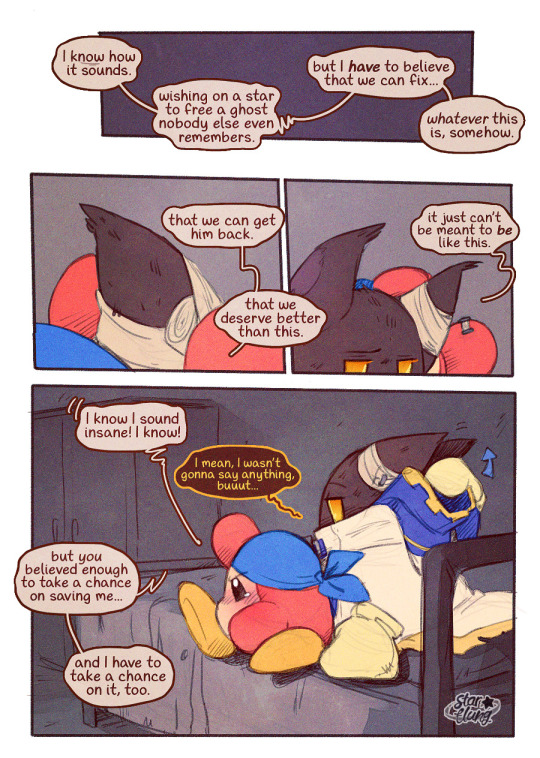
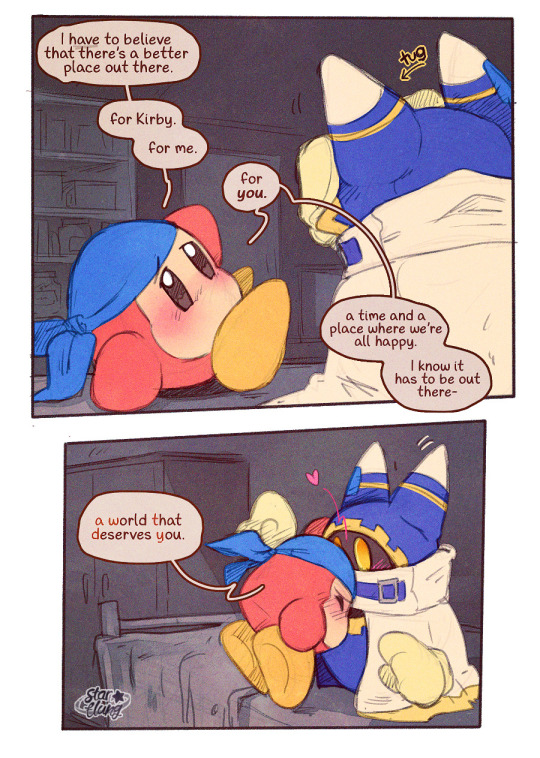
#hopefully this fills the 'any more stuff' prompt though!#another potential title was “the infinity integer” which tbh i think still goes SO hard#anyway this is pretty much the nuts and bolts of the core AU#magolor teaches bandee how to build ancient artifacts and solve time anomalies#bandee teaches magolor how to feel a fucking feeling#awtdy au#my art#my comics#bandana waddle dee#magolor#cw injury#also i think this goes without saying but just due to a message i received last time i posted about them:#i have always headcanoned that they're both adults of the same age.#this scene is actually completely platonic but i'm going to tag this anyway just in case for folks who specifically want to avoid it ->#bandee x magolor#🍎
187 notes
·
View notes
Text
Fun fact about chants of sennaar,
If you replay the game on language settings that you don't speak you unlock translation puzzles 2.0
#I've memorized basically every language#except for the bards and the exiles#bards because I just can't wrap my head around the syntax and the alphabet doesn't like to stick#and exiles because there's no interesting puzzles or core gameplay to learning their language#but reading messages in the fictional language with a real world language on top?#idk#makes the game much more fun to me#chants of sennaar
165 notes
·
View notes
Text
“Love him,” said Jacques, with vehemence, “love him and let him love you. Do you think anything else under heaven really matters? And how long, at the best, can it last, since you are both men and still have everywhere to go? Only five minutes, I assure you, only five minutes, and most of that, hélas! in the dark. And if you think of them as dirty, then they will be dirty—they will be dirty because you will be giving nothing, you will be despising your flesh and his. But you can make your time together anything but dirty; you can give each other something which will make both of you better—forever—if you will not be ashamed, if you will only not play it safe.” (…) “Somebody,” said Jacques, “your father or mine, should have told us that not many people have ever died of love. But multitudes have perished, and are perishing every hour—and in the oddest places!—for the lack of it.”
- Giovanni’s Room, James Baldwin
#james baldwin#giovanni’s room#words#jasmine has thoughts#i know this is like the classic quote everyone knows but if it’s the core message of the novel what am i supposed to do#not make a post that already exists many times? no. anyway. beautiful
1K notes
·
View notes